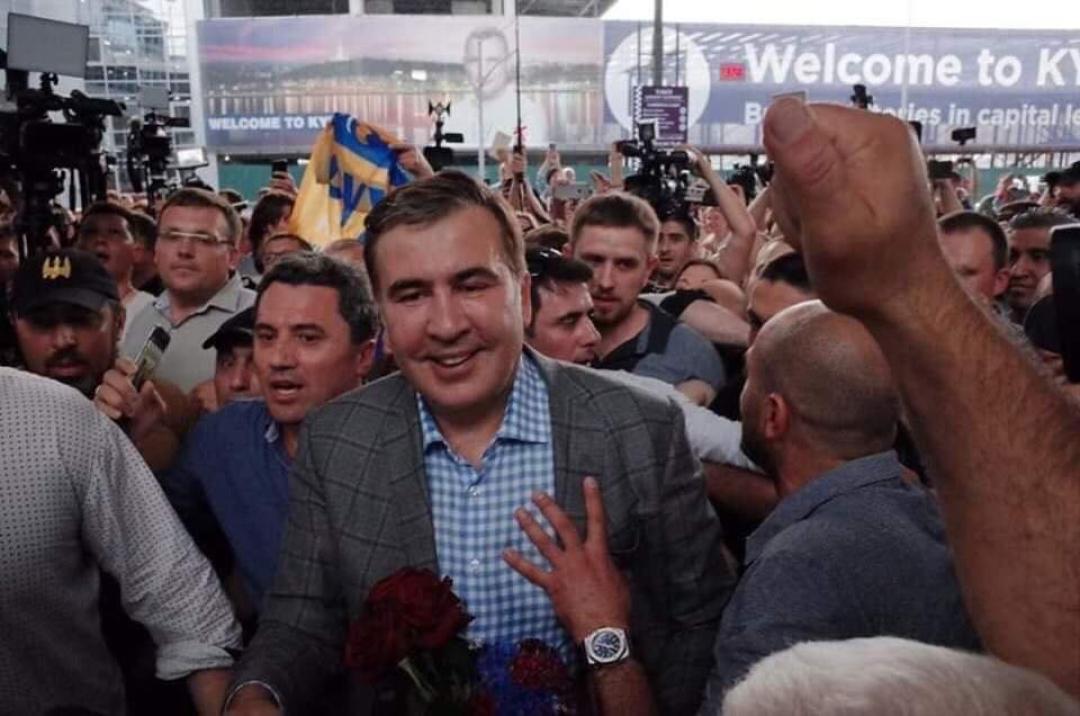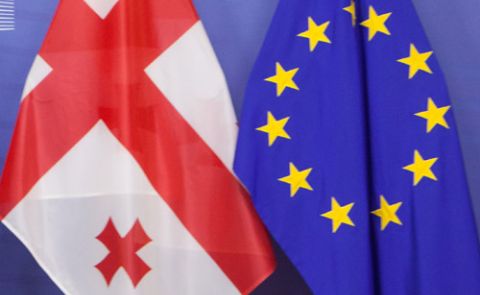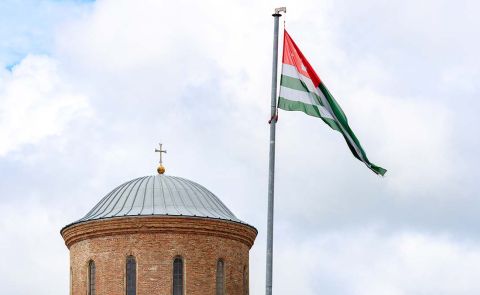
Despite Saakashvili’s Appointment, Close Georgia-Ukraine Relations Will Persist

Georgia-Ukraine relations experience a crisis caused by the appointment of Mikheil Saakashvili to a high-level position in Kyiv. Though problematic for the bilateral relations, wider geopolitical imperatives in the Black Sea region and the South Caucasus will pull the governments in Tbilisi and Kyiv closer together.
On 7 May, Ukrainian President Volodymyr Zelensky appointed Georgia’s former President Mikheil Saakashvili as the head of the Executive Reform Committee. The announcement drew criticism from the Georgian leadership, which in turn caused responses from Kyiv.
Many analysts in Georgia believe that a diplomatic crisis might follow. Indeed, first steps and statements from the politicians in Georgia and Ukraine give some signs for concerns. For example, in what potentially might evolve into a high-level diplomatic spat between the two states, Georgia, following Saakashvili’s appointment, recalled its ambassador to Ukraine, Teimuraz Sharashenidze, to Tbilisi for diplomatic consultations. “It is unacceptable that a person convicted in Georgia is appointed to a political post in a country that is a strategic partner,” – the ambassador stated.
With no signs of reconsideration, the Ukrainian president reacted by stating that Saakashvili is now a Ukrainian citizen and the decision is the internal issue of the country. Zelensky also stated that the recalling of Georgian Ambassador to Ukraine for consultations in Tbilisi was the ‘wrong move.’
The official reaction from the Georgian side was swift. The country’s PM, Giorgi Gakharia, openly questioned Ukraine’s decision: “The appointment of Saakashvili in the Ukrainian government, who was sentenced in absentia in Georgia and has been wanted for several years, is absolutely unacceptable.” Similar statements followed from the Georgian ministry of foreign affairs as well as a number of parliamentarians and ministry-level figures.
With no sign of abating, in fact, there could be a further complication in the strained bilateral relations. Days after his appointment, Saakashvili said that the former Prosecutor General of Georgia, Zurab Adeishvili, who stands convicted and wanted for multiple crimes in Georgia, is engaged in reforms implementation as an advisor of the prosecutor general of Ukraine.
The Context behind Saakashvili’s Appointment
As described above, Saakashvili’s appointment has already damaged bilateral relations. However, eventually all will depend on whether Saakashvili proves effective and influential in his new position as a key reform-advisor. This is important as it could have a major effect on internal Georgia, which braces itself for crucial parliamentary elections in October of this year. Indeed, a successful Saakashvili will be a major boost for his somewhat dwindled support base in Georgia. Saakashvili’s unsuccessful tenure, on the hand, will harm him politically back home. This would be used by the Georgian Dream (GD) for its pre-election campaign.
Therefore, it is more important to understand the context in which Saakashvili’s appointment took place and what the chances are for him to be successful in his new position. It should be said that his new role in a little-known government advisory body is a significant lowering in his position (even in comparison with what positions he held in Ukraine before, namely serving as a governor of Ukraine’s Odessa region).
Many questions also exist as to the timing of his appointment. This comes after Zelensky dismissed a number of famous Ukrainian reformers. Some even think that Saakashvili’s re-appearance on the Ukrainian political scene is Zelensky’s political attempt to dissipate/redirect criticism from the government’s rather unpopular decision to get rid of the reformers.
Yet another big question mark is how much power, i.e. influence, Saakashvili might actually legally possess. His position is advisory, which bears no executive power. This puts him under strict control and influence of Zelensky and the members of the president’s cabinet.
Geopolitics will pull the countries closer
Surely, Saakashvili’s appointment could have some reverberations in Ukraine-Georgia relations. However, wider geopolitical issues are likely to dissipate the limited negative impact. It is true that Georgia is small economically and not significant militarily, but its location as a transit hub and a Black Sea country makes it an important country for Ukraine. In the age of Russia’s resurgent Black Sea power, which primarily threatens Ukraine’s seacoast and limits its ability to enter the inner Azov Sea through the Kerch Strait, Kyiv is interested in cooperating with as many Black Sea states as possible. Georgia stands out as its ports annually receive the US navy ships and is an important partner for the US, which in turn is Ukraine’s supporter in security and military matters.
Russia’s geopolitical moves since the 1990s serve as a powerful catalyzer for Georgia and Ukraine to cooperate in security and military realms and build closer economic relations. Both states have territorial troubles with Russia, both witnessed outright military invasions, occupation/annexation of some parts of their respective territories.
Other geopolitical sticking points are also present. One of them is GUAM (initially called GUUAM), an organization for democracy and economic development, established in 1997 following the collapse of the Soviet Union. Though discarded by many as ineffective, the organization nevertheless unites in itself the states along Russia’s borderlands which experience geopolitical pressure from the Kremlin and thus are interested in cooperating with each other.
The logic of geopolitics could be read along the lines of the statements made following Saakashvili’s appointment. Though the majority of the analysts, political commentators and politicians paid attention to the criticism from official figures both in Ukraine and Georgia, the governments in Tbilisi and Kyiv are clear on whether the appointment would have geopolitical ramifications: “As for relations with Ukraine, the Georgian side will make every effort to maintain partnership relations with Ukraine and even deepen them. Our Ukrainian partners share this position. We have common views on the most important issues for us, such as Euro-Atlantic integration, de-occupation, strengthening democratic institutions, and we enter the international arena with this unity,” said Georgia’s ambassador to Ukraine in an interview with Georgia’s First Channel.
Another example comes from Prime Minister Giorgi Gakharia: “Ukraine is our strategic partner. A narrow political conjuncture cannot alter this in the long run.”
“We have excellent relations with Georgia. We will not recall our ambassador for consultations for the issue as relations between our countries count more years than any governments of either country. I believe that it is a mistake made by the Georgian government (the summoning of the ambassador for consultations),” Ukrainian media outlets cited Zelensky as saying.
The Ukrainian Foreign Ministry has stated that recalling the ambassador for consultations ‘is not a daily, but a common practice in diplomatic work.’ “We do not see this decision as a threat to relations between our friendly states. We have many common positions and common challenges,” said the Ukrainian Foreign Ministry.
Thus, despite some harsh political statements exchanged between Georgia and Ukraine, both share similar geopolitical dilemmas that pull both states together. Crucial for years to come will be Russia’s military and political moves in the Black Sea region and the South Caucasus. Seen from this perspective, Saakashvili’s appointment is unlikely to have a lasting negative effect on the bilateral relations. Moreover, as shown above, the former Georgian president’s new position does not have large executive powers and he is likely to receive a significant pushback from the members within the Zelensky’s government, fearful of being overshadowed by Saakashvili.
See Also


BP Strengthens Presence in Azerbaijan’s Offshore Energy Sector

Netanyahu’s Letter to Aliyev: Mutual Trust, Solidarity Following Hamas Attacks, Facilitating Dialogue Between Israel and Türkiye

Azerbaijan Expands JF-17 Thunder Fighter Jet Order from 16 to 40 Units

EU Commissioner and NATO PA Warn Georgia Over Democratic Decline Amid Accession Challenges

